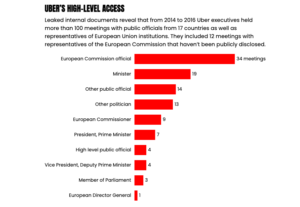German MEP Daniel Freund has asked European Parliament President Roberta Metsola to investigate the conduct of lobbyists in Brussels following revelations that former European Commissioner for Competition and Vice President for the digital agenda, Neelie Kroes, lobbied on behalf of ride-hailing company Uber during her “cooling-off period” after her stint as a Commissioner.
A month after Uber launched in Malta to glowing press coverage, a global investigation by The Guardian and the International Consortium of Investigation Journalists (ICIJ) revealed how the ride-hailing company “broke laws, duped police, and secretly lobbied governments”.
Uber in Malta was rolled out in partnership with Alf Mizzi and Sons, one of the major advertisers in the Maltese press. While virtually every single press outlet in Malta hailed the arrival of the ride-sharing app, replicating the company’s statement without question, The Shift reported the real story, showing the company’s track record on labour rights issues.
Spotlight on high-power lobbying in Europe
Freund’s letter to Metsola is part of a growing call for European institutions to investigate Kroes’ conduct after she was named in the Uber files that appear to show Kroes offering to arrange a series of meetings for Uber with EU officials during her 18-month “cooling-off period” after leaving the Commission.
If you violate EU lobbying rules, there have to be consequences.
I asked @EP_President to investigate conduct of @Uber lobbyists in Brussels and – if necessary – de-activate their entry badges to EP premises. pic.twitter.com/MNq4QUeo6T
— Daniel Freund (@daniel_freund) July 12, 2022
The cooling-off period, which for Kroes ran from November 2014 to May 2016, is meant to reduce conflicts of interest by restricting the jobs Commissioners can take once they have stepped down.
According to the documents obtained by ICIJ, Kroes had requested to join Uber’s Public Policy Advisory Board in 2015, but the European Commission’s ad hoc ethics committee said it would violate the rules for her to take the job during the so-called cooling-off period at the time.
Despite not obtaining permission, the leaked documents suggest that Kroes still went on to act in an unofficial capacity for Uber for more than a year while she was officially banned from working for them.
Kroes, who has denied any wrongdoing, is one of the many high-level officials to which Uber gained access and is not the only public figure exposed in the Uber Files now facing tough questions.
French President Emmanuel Macron is also facing calls for a parliamentary inquiry over his relationship with Uber, as the investigation details the undisclosed meetings and communications he had with company executives while serving as economy minister.

Summary by The Guardian and ICIJ of the number of meetings between Uber executives and public officials. Source: The Uber files
The Uber files
The Uber files is a global investigation into a cache of 124,000 confidential documents, including from the tech company, that was leaked to The Guardian which was then shared with the investigative consortium.
The leak consists of emails, iMessages and WhatsApp exchanges between the company’s most senior executives, as well as memos, presentations, notebooks, briefing papers and invoices. The files cover 40 countries and span from 2013 to 2017, which is the period that saw Uber’s frenzied and aggressive global expansion.
The data was leaked by Mark MacGann, a former chief lobbyist for Uber in Europe, the Middle East and Africa who told The Guardian in an exclusive interview, “I’m exposing a system that sold people a lie”. He said he had decided to speak out because he believed Uber’s senior executives knowingly flouted laws in dozens of countries about the economic benefits to drivers of the company’s gig economy model.
The files go on to reveal a plethora of ethically questionable practices that Uber employed to break into new markets where very often, existing laws and regulations made its operations illegal, and how it then forcefully lobbied for those same laws and regulations to be changed to accommodate it as well as how it deployed a so-called “kill switch” to cut access to Uber data during police raids of the company’s offices around the world.
Other revelations include how the company negotiated investment deals with now-sanctioned Russian oligarchs and exploited violence against Uber drivers to push for favourable regulations and even how the company created a dummy version of its app designed to fool regulators.
A history of hostility
Even before the global investigation by the ICIJ, it was widely known that Uber, a US start-up founded in 2010, underwent exceptional growth over very few years thanks to an aggressive and unscrupulous attitude toward laws and regulations.
Uber’s CEO at the time, Travis Kalanick became known for his defiant and openly hostile attitude towards authorities, and the company has long been plagued by a series of missteps and scandals. In 2017, Kalanick was forced to resign.
In response to the global investigation Jill Hazelbaker, Uber’s senior vice-president of public affairs, issued a statement saying that the company “will not make excuses for past behaviour that is clearly not in line with our present values”.
Following Uber’s launch in Malta, The Shift decided to take a closer look at the company’s track record and what it could mean for labour rights in Malta especially since the problems that have plagued Uber in the past have already been felt in Malta through the unregulated practices of similar app-based companies.













It is a shame to see companies like Uber resort to bribery to gain their strong foothold in a country.
Did the Maltese corrupt entrepreneurs copy Uber or vice versa?
If Roberta Mezzola intends to leave a legacy after she leaves , she should throw out all these lobbyists. They are the source of ALL Corruption. It is their job to corrupt politicians. Throw them out and anybody who votes against should be investigated.